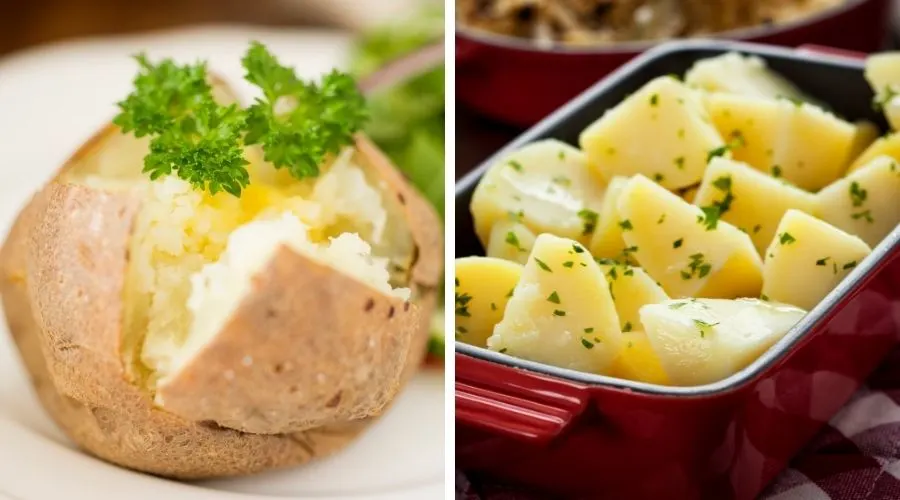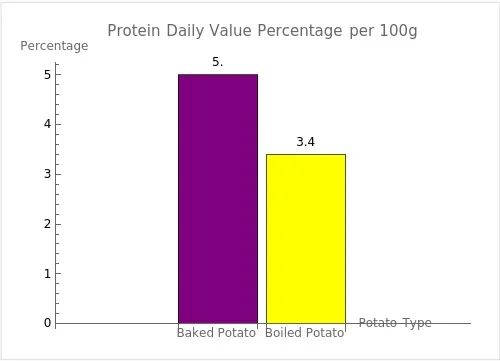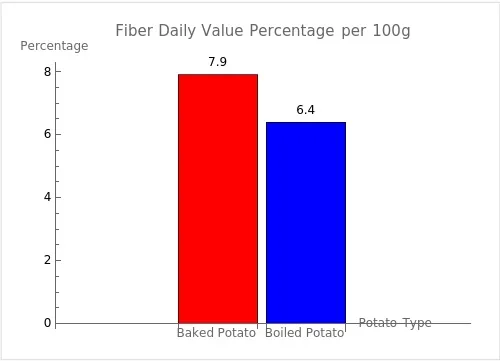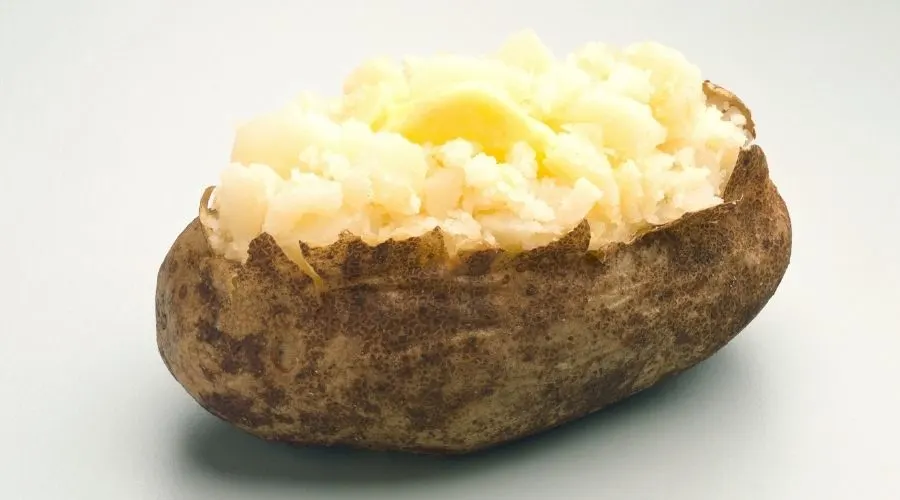We’re told that baked potatoes are the healthier option because of the nutrients found in the skin, but is there really much difference between them and a basic skinless boiled potato when it comes to nutrition?
In this article, I’ll be comparing baked potato nutrition in each category against skinless boiled potatoes to find out how much difference there is between the two and whether we should be choosing one over the other.
So read on to find out more and see which kind of potato comes out as the nutritional winner.
Also in This Article
In a hurry, or looking for something specific? Use the links below to jump to the relevant section:

Baked Potato Vs. Boiled Nutritional Comparison
In this nutritional comparison, I’ll be comparing the nutritional values of baked potatoes (skin-on) against potatoes that have been boiled (without the skin) to find out how much difference the skin and cooking methods make to the overall nutrition.
To keep things fair and accurate, I’ll be using like-for-like data from the USDA, and the comparison will be weight-for-weight per 100g of each potato.
The potatoes I’m comparing are cooked completely naturally without added ingredients such as salt or fat.
Best for Calorie Content
Starting with the calorie comparison and both kinds of potatoes are fairly similar, but of the two, baked potatoes are slightly higher in calories than boiled skinless potatoes.
While it might be tempting to go for the lower calorie option if this is something you’re tracking, it’s important to know the difference is small, and the extra calories are due to the baked potatoes’ nutritionally-packed skin and the fact they contain less water.
| Potato Type | Calories Per 100g |
| Baked Potato Including Skin & Flesh | 93kcal |
| Boiled Potato Skinless/Flesh Only | 86kcal |
Best for Carbohydrate & Sugar Content
Neither Baked potato nor boiled potatoes fall into the category of low-carbohydrate foods, but for information, baked potatoes contain slightly more carbs and natural sugars per 100g than skinless boiled potatoes.
| Potato Type | Carbohydrates Per 100g | Of Which are Sugars |
| Baked Potato Including Skin & Flesh | 21.2g | 1.8g |
| Boiled Potato Skinless/Flesh Only | 20g | 0.89g |
Best for Protein Content
If the protein content of potatoes is an important factor for your diet, then of the two, baked potatoes contain more protein per 100g than boiled potatoes.
As you can see from the table below, the difference is fairly small with baked potatoes containing 0.63g more protein per 100g than boiled skinless potatoes.
| Potato Type | Protein Per 100g |
| Baked Potato Including Skin & Flesh | 2.5g |
| Boiled Potato Skinless/Flesh Only | 1.71g |

- Baked Potato: The daily value percentage of protein is approximately 5%.
- Boiled Potato: The daily value percentage of protein is approximately 3.4%.
Best for Fat Content
As you’d expect, the fat content of both kinds of potatoes is minimal, but of the two, baked potatoes contain 0.3g more fat per 100g compared to skinless boiled potatoes.
It’s important to note this is a nominal amount, and any additional fat is naturally occurring due to the presence of the skin and the cooking method.
According to USDA data, neither baked potatoes nor boiled potatoes contain any saturated fat or cholesterol.
| Potato Type | Fat Per 100g |
| Baked Potato Including Skin & Flesh | 0.13g |
| Boiled Potato Skinless/Flesh Only | 0.1g |
Best for Fiber Content
When it comes to fiber content, potatoes baked with the skin contain more dietary fiber than skinless potatoes boiled in water.
The difference isn’t as much as you might think, with baked potatoes containing 0.4g more fiber than skinless boiled potatoes. Still, there is a difference; making baked potatoes with the skin is the better option in this category.
| Potato Type | Dietary Fibre Per 100g |
| Baked Potato Including Skin & Flesh | 2.2g |
| Boiled Potato Skinless/Flesh Only | 1.8g |

- Baked Potato: The daily value percentage of fiber is approximately 7.9%.
- Boiled Potato: The daily value percentage of fiber is approximately 6.4%.
The recommended daily intake of fiber for an average adult on a 2,000 calorie diet is about 28 grams.
Best for Sodium/Salt Content
As mentioned above, this comparison is made between potatoes that haven’t been cooked with any added salt.
They do have a small amount of natural sodium, which is slightly higher in baked potatoes than boiled potatoes, once again, these amounts are tiny, and the difference is nominal.
| Potato Type | Sodium/Salt Per 100g |
| Baked Potato Including Skin & Flesh | 10mg |
| Boiled Potato Skinless/Flesh Only | 5mg |
Best for Vitamins/Minerals
The biggest difference between baked potatoes with the skin on them compared to skinless boiled potatoes is the presence of naturally occurring vitamins and minerals.
Keeping the skin on potatoes leads to increased amounts of various vitamins and minerals, especially calcium, vitamin C, phosphorus, and potassium.
This confirms that to get the most out of the healthier aspect of potatoes, baking them with the skin on does make a difference nutritionally.
| Vitamin/Mineral Type | Baked Potato Amount Per 100g | Boiled Potato Amount Per 100g |
| Calcium | 15mg | 8mg |
| Iron | 1.08mg | 0.31mg |
| Phosphorus | 70mg | 40mg |
| Potassium | 535mg | 328mg |
| Magnesium | 28mg | 20mg |
| Thiamin | 0.064mg | 0.098mg |
| Riboflavin | 0.048mg | 0.0019mg |
| Vitamin B6 | 0.311mg | 0.269mg |
| Vitamin C | 9.6mg | 7.4mg |
| Vitamin A | 1mcg | – |
| Vitamin B12 | – | – |
| Niacin | 1.41mg | 1.31mg |
| Folic Acid | – | – |
| Zinc | 0.36mg | 0.27mg |
*mcg = microgram (1000th of a milligram) / mg = milligram (1000th of a gram)

Overall Winner & Summary
I’ve now compared all categories, and although boiled potatoes are slightly lower in calories, carbs, and natural sugars, the benefits of baked potatoes outweigh these small differences due to the extra fiber, vitamins, and minerals you get from cooking potatoes in their skins.
However, if you don’t like potato skins (because not everyone does), boiled skinless potatoes also contain some dietary fiber, vitamins, and minerals, just not as much as they do with the skins.
Hopefully, the data comparisons in this article can help you decide which kind of potato is best for you based on your dietary requirements.
Water Content of Baked Potatoes Vs. Boiled
I mentioned above that the water content of boiled, skinless potatoes is higher than the water content of potatoes baked with their skin on, so I just wanted to touch on the difference between the two.
All kinds of potatoes have a relatively high water content, which varies between varieties, but an average baked potato contains 74.9g of water per 100g compared to skinless boiled potatoes, which contain 77g per 100g.
More Baked Potato Vs. Boiled FAQ’s
Yes, potatoes are healthier with the skin on due to the extra fiber, vitamins, and minerals they contain when compared to skinless potatoes.
According to data provided by the USDA, potatoes lose more nutrients when they’re boiled in their skins compared to potatoes which are baked in their skins.
Related Articles
I hope this article has helped you to find the information you were looking for; you might also find the following articles helpful too:
Fresh Pineapple Vs. Canned (Which is Best?)
Canned Corn Vs. Frozen (Which is Best?)
Cheerios vs Grape Nuts (Which One Should You Get)
References Used for this Article
To ensure the nutritional information used in this article is accurate, I have used data from FoodData Central; the links below contain the source information:
